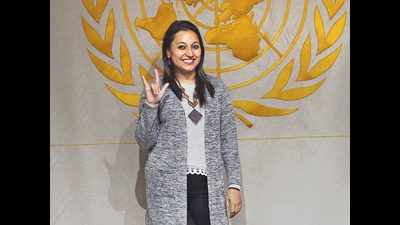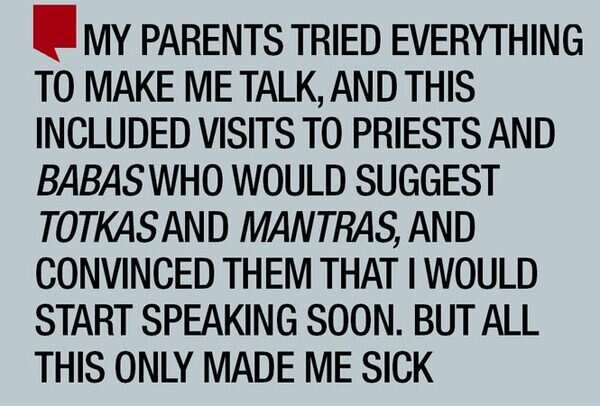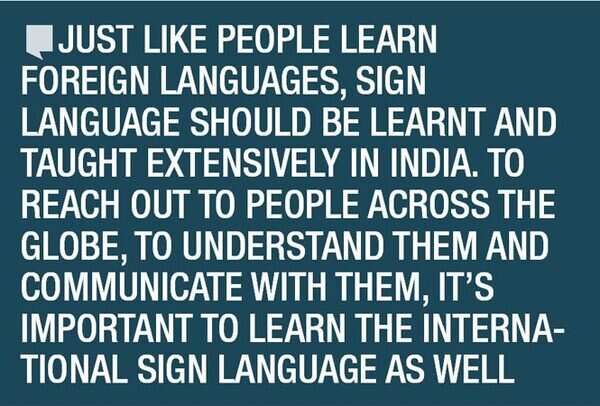- News
- City News
- delhi News
- Rupmani Chhetri, India's first differently-abled UN volunteer: India is not at all disabled-friendly
Trending
This story is from April 5, 2017
Rupmani Chhetri, India's first differently-abled UN volunteer: India is not at all disabled-friendly
Till date, around 1,800 Indians have worked as international volunteers, but what makes Rupmani's case unique is the fact that she is the first differently-abled Indian to be selected for this role.

Rupmani Chhetri, the first differently-abled Indian selected for the United Nations Volunteers (UNV) programme, is currently in Ukraine, where she will spend the next two years (BCCL/ Samik Sen)
Sitting in the United Nations office in Lodhi Estate on a Monday afternoon, Rupmani Chhetri looked excited. She had just returned from the Ukraine visa office, and it had been a successful visit – she is currently in Ukraine, where she will be spending the next couple of years as part of the United Nations Volunteers (UNV) programme. Till date, around 1,800 Indians have worked as international volunteers, but what makes Rupmani's case unique is the fact that she is the first differently-abled Indian to be selected for this role."I have been associated with UN programmes for some time now and have taken part in events and conferences, but this is the first time I will be working as part of the UN family. I feel excited and greatly encouraged," says Rupmani.
'It has been a difficult journey'
The 30-year-old was born in Nepal and when she was six months old, her family moved to India – Darjeeling, to be precise. "There was little knowledge about hearing and speech impairment and my school did not realize that I needed sign language to communicate. They tried everything to make me utter words, and would even pull my lips so that I could make some noise. I was even beaten up by the teachers for using sign language," she signs. "My parents tried everything to make me talk, and this included visits to priests and babas who would suggest totkas and mantras and convinced them that I would start speaking soon. But all this only made me sick," adds Rupmani. She felt life would be better when she befriended a Delhi-based man, who also had hearing impairment. They ran away and came to the capital and got married. "But I soon realized that I was being discriminated against further," she says. "My husband did not like it when I would interact with other people. He would want me to stay at home. My unhappiness grew and I realized that I had to get out of the relationship. It was not easy, but I went for a divorce. These were clearly some very difficult times in my life." The divorce was tough, but it helped make her stronger, says Rupmani. Today, she is an executive member of the National Association of the Deaf (NAD).

"India is not at all disabled-friendly, and if you are a woman, your life is often tougher," says Rupmani, adding, "For those who can't hear or/and speak, communication is a big problem and very few people understand sign language. The situation is worse in rural areas. For instance, when girls with hearing and speech impairment start menstruating, there is often no proper communication, as a result of which many, for years, have no clue what is happening to them and live with a sense of guilt and shame. This is just one of the many problems we face. Atrocities committed against differently-abled persons hardly ever make it to the news. Communication is the key, we have to reach out to them."
Lack of interpreters in India
According to the government census of 2011, there are 3 million deaf people in India. However, according to conservative, non-governmental estimates, there are 18 million deaf people in the country. In India, there are only 250 certified, trained interpreters for the Indian sign language. "There are very few people who know sign language in India," says Rupmani, and adds, "In case of hearing disability, one needs to be dependent on an interpreter at every stage. Just like people learn foreign languages, sign language should be learnt and taught extensively in India. To reach out to people across the globe, to understand them and communicate with them, it’s important to learn international sign language as well." Recounting how she learnt international sign language, Rupmani says, "I took some classes and also learnt it through social media, like YouTube and Facebook. Just like any other language, I started learning it faster when I started interacting with people from other countries."

'Help differently-abled kids believe in themselves'
Adding a piece of advice for parents with kids who are differently abled, she says, "Just empower them and help them believe in themselves. There is no need for sympathy. They can achieve anything. Just remove the ‘im’ from impossible."
Like most Indians, cricket and Bollywood are very much on Rupmani’s mind. Talking about her favourite stars, she says, "Not very difficult to guess – Sachin and Shah Rukh Khan!"
'It has been a difficult journey'
The 30-year-old was born in Nepal and when she was six months old, her family moved to India – Darjeeling, to be precise. "There was little knowledge about hearing and speech impairment and my school did not realize that I needed sign language to communicate. They tried everything to make me utter words, and would even pull my lips so that I could make some noise. I was even beaten up by the teachers for using sign language," she signs. "My parents tried everything to make me talk, and this included visits to priests and babas who would suggest totkas and mantras and convinced them that I would start speaking soon. But all this only made me sick," adds Rupmani. She felt life would be better when she befriended a Delhi-based man, who also had hearing impairment. They ran away and came to the capital and got married. "But I soon realized that I was being discriminated against further," she says. "My husband did not like it when I would interact with other people. He would want me to stay at home. My unhappiness grew and I realized that I had to get out of the relationship. It was not easy, but I went for a divorce. These were clearly some very difficult times in my life." The divorce was tough, but it helped make her stronger, says Rupmani. Today, she is an executive member of the National Association of the Deaf (NAD).

'India is not disabled-friendly'
"India is not at all disabled-friendly, and if you are a woman, your life is often tougher," says Rupmani, adding, "For those who can't hear or/and speak, communication is a big problem and very few people understand sign language. The situation is worse in rural areas. For instance, when girls with hearing and speech impairment start menstruating, there is often no proper communication, as a result of which many, for years, have no clue what is happening to them and live with a sense of guilt and shame. This is just one of the many problems we face. Atrocities committed against differently-abled persons hardly ever make it to the news. Communication is the key, we have to reach out to them."
Lack of interpreters in India
According to the government census of 2011, there are 3 million deaf people in India. However, according to conservative, non-governmental estimates, there are 18 million deaf people in the country. In India, there are only 250 certified, trained interpreters for the Indian sign language. "There are very few people who know sign language in India," says Rupmani, and adds, "In case of hearing disability, one needs to be dependent on an interpreter at every stage. Just like people learn foreign languages, sign language should be learnt and taught extensively in India. To reach out to people across the globe, to understand them and communicate with them, it’s important to learn international sign language as well." Recounting how she learnt international sign language, Rupmani says, "I took some classes and also learnt it through social media, like YouTube and Facebook. Just like any other language, I started learning it faster when I started interacting with people from other countries."

'Help differently-abled kids believe in themselves'
Adding a piece of advice for parents with kids who are differently abled, she says, "Just empower them and help them believe in themselves. There is no need for sympathy. They can achieve anything. Just remove the ‘im’ from impossible."
Like most Indians, cricket and Bollywood are very much on Rupmani’s mind. Talking about her favourite stars, she says, "Not very difficult to guess – Sachin and Shah Rukh Khan!"
End of Article
FOLLOW US ON SOCIAL MEDIA










